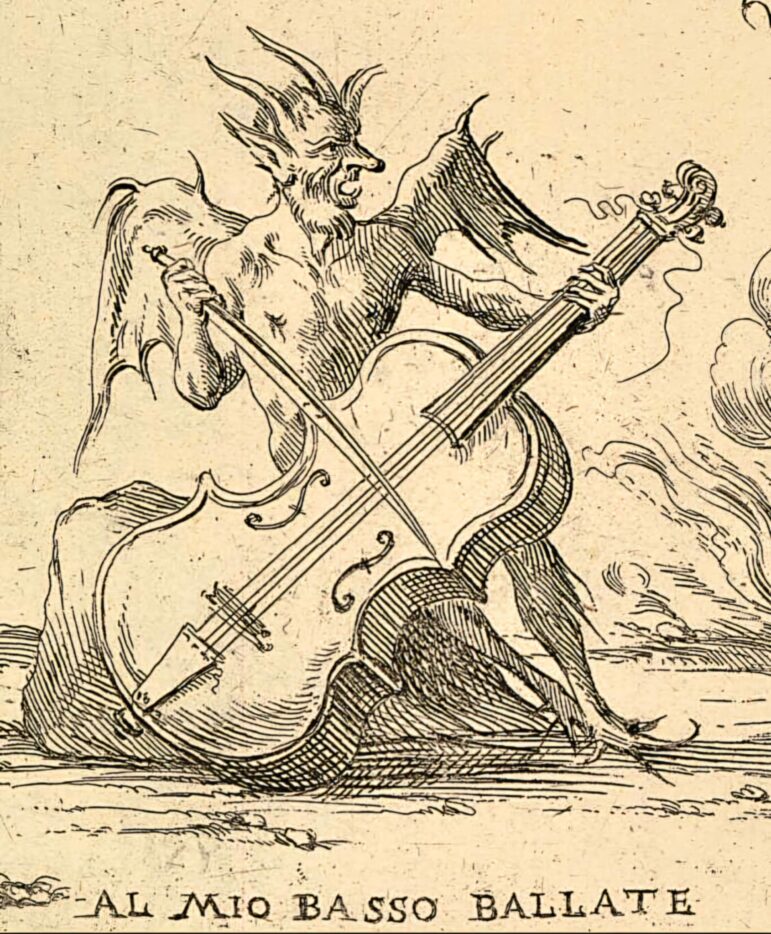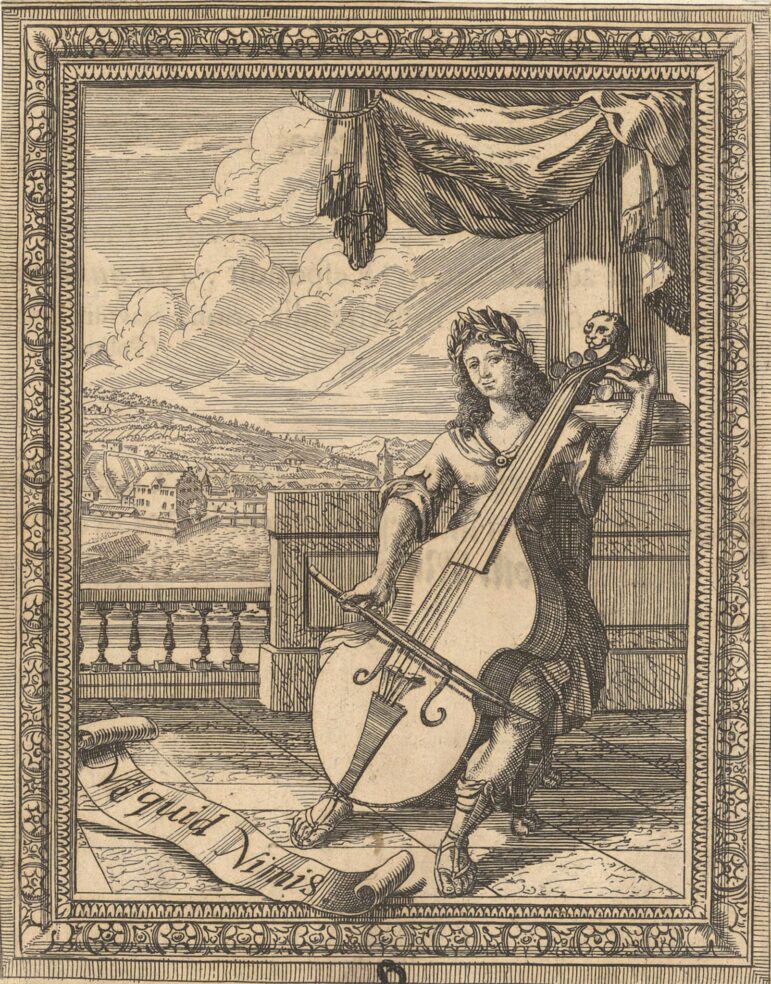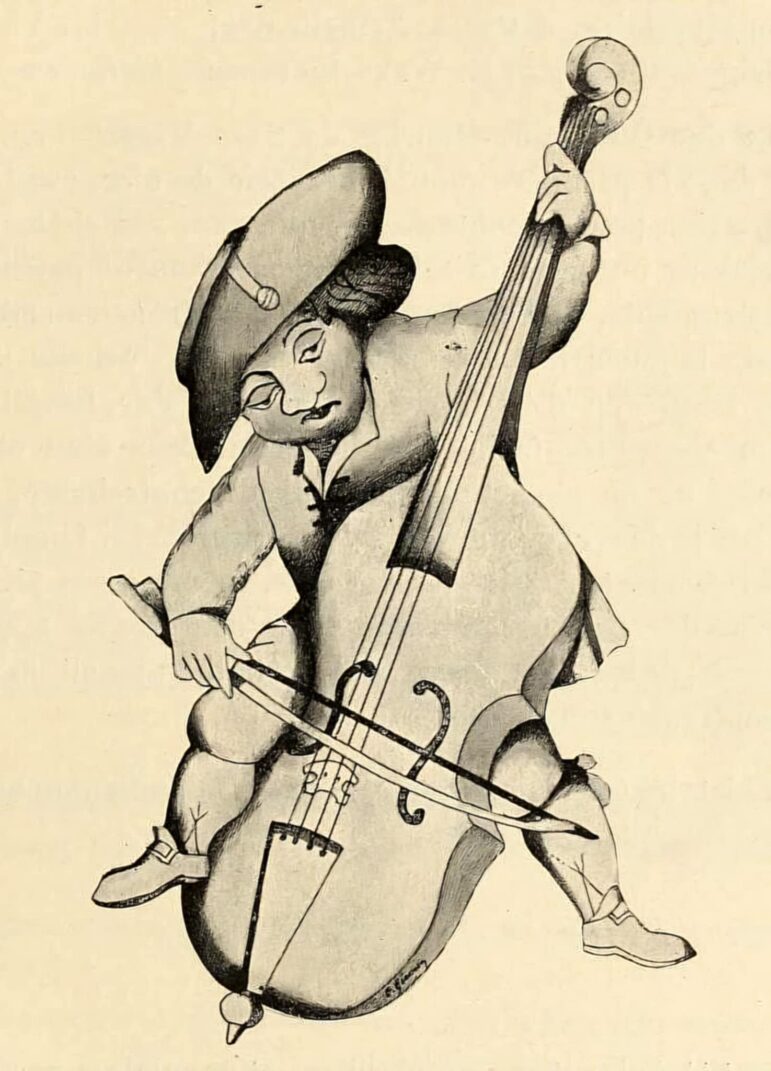
The little church was in Austin, Texas. I don’t remember what Christian denomination it was, but I remember it was small and had an altar area that was more like a stage in an old American Legion Hall than a holy space.
It was sometime in the late 1990s, when I was studying music at the University of Texas. Back then, it was just a regular music department. Now, it’s the fancy Butler School of Music.
The church’s music director somehow got my name and number and hired me to play string bass for a church service on some church holiday. He also wanted to meet up for lunch and talk about our shared alma mater. We had both studied music at the University of California at San Diego, albeit many years apart.

Would you trust these musicians to play in your church? (Art by Giovanni Tommasso Borgonio, 1650) [Public Domain]
Everything was cool. The music was easy. The rehearsal was easy. The parking was easy. No worries.
During the service, I was placed way over at stage right. String bass players are used to standing off to the side. We’re sometimes stuck in the offstage wings, if the orchestra is big enough.
Music is usually just a small portion of a church service. The hired musicians mostly sit there and wait to play while the religious stuff happens.
Back then, before smartphones existed, I would always have a book in my bass case to read during the long downtimes musicians have at these things.
When we weren’t actively playing during that particular service, I set my big bass down on the floor, sat on the provided chair, and quietly read the book on my lap. No big deal.
It actually was a big deal.
As I was packing up after the gig, the music director popped up in front of me. This is normal, because they’re the ones who hand us our checks after we’re done.
But he didn’t have the normal “thank you for sharing your gifts with us” smile. He seemed extremely nervous and didn’t really look me in the eye.
“The members of the congregation,” he said, “are extremely upset that you were reading a book during the sermon.”
There it was. The sticky widget at the heart of the relationship between professional musicians and the church folk who hire them.
Intellectually, the church people want professional musicians to come in and provide a quality musical setting for the important services on their worship calendar. They clearly understand that we’re not part of their religious community and that we’re hired solely for our musical abilities.
Emotionally, they want us to be transfixed and transformed by the service, accept the faith, and (hopefully) turn down the check and thank them for the enlightenment.
It has been ever so.
“Entirely insufferable transgressions and offenses”
One of my favorite days in the music history course at UCSD was when we learned about rules for church musicians during the Renaissance. Decades later, I repurchased a copy of our main course text – Music in the Western World: A History in Documents by Weiss and Taruskin – specifically so I could assign those particular readings to my own music history college students.
I vividly remember reading rules that stated musicians were not allowed to show up drunk to Sunday morning services. They weren’t allowed to bring prostitutes with them. They couldn’t bring their own snacks to eat during the communion portion. Stuff like that. It was hilarious.
I’ve never been able to track those specific bits down again, even with all the internet search engines at my disposal. The textbook does have some good stuff, though.
A document from the Sistine Chapel in Rome states that “the pope’s kitchen” will provide a box lunch to be divided among the musicians and insists that performers shut up when the holiest of holies is being performed. I’ve had plenty of those provided meals (few of them good) and can testify that musicians do indeed gossip and tell each other jokes (some of them dirty) during the sacred bits.
Another document, this one from Milan, specifies exactly where musicians are to change their clothes, states that they can’t leave the chapel during divine offices, can’t leave early, can’t loiter on the steps outside, can’t have visitors in the musician area, can’t send substitute musicians, must “be proper and modest in action and word” during the service, can’t show up late, and can’t miss the gig.
I confess that I have often changed into a tux in the church parking lot, have left the chapel to use the restroom, have rushed out for another gig, have seen musicians smoking on the steps outside, have seen musicians bring their girlfriends, have seen subs show up when someone got a better gig, and so on.
These, however, are the best parts of this particular set of rules:
10. When the singers are in the chapel they shall utter no blasphemy, under penalty of being punished at the discretion of the authorities…
15. No one shall be admitted to the chapel if he has not first been vouched for by a trustworthy person as to his character and habits, that he lives in a Christian fashion, that he confesses several times a year, that he is not disrespectful, that he is neither a thief nor a blasphemer, nor stained with any other sin…
Oops! That crosses out a whole lotta musicians.
Other documents from the period record the problems Flemish composer Jacob Obrecht had with his church musicians. Among myriad offenses, the musicians engaged in “continual mockery and chatter,” were “extremely lazy, disobedient, and wholly incapable,” and indulged in “various and numerous mockeries, confabulations, and also other entirely insufferable transgressions and offenses.” Sounds like my kind of people!
Even farther back, during the medieval period, a Christian theologian named Honorius of Autun was extremely clear in his opinion of working musicians. “Do the jongleurs have any hope? None. Because they are from the bottom of their hearts the ministers of Satan.”
Bishop John of Salisbury went a step further, compared musicians to pimps and prostitutes, and called on royal powers “rather to exterminate entirely than to foster” the “human monsters.”
This bile was belched out nearly 900 years before the Satanic Panic freakout over heavy metal music. History is a serpent biting its own tail.

How pious folk view bass players (Art by Giuseppe Maria Mitelli, 1688) [Public Domain]
Even if we laugh off the excesses of anti-music church leaders, the lists of rules are telling. Those who study history know that official decrees outlawing described behaviors are often good evidence that those particular behaviors were indeed occurring. See, for example, Charlemagne’s Capitulatio de partibus Saxoniæ outlawing very specific religious practices by the pagan Saxons.
So there really is an extremely long history of tension between professional musicians treating church gigs as gigs and the church people who hire them expecting pious reverence (and maybe even conversion) along with the performance.
Little-h heathen musicians playing in churches are quite common, but I’ve also had a wide range of experiences as a capital-H Heathen musician hired to play for religious services.
Gospel music and mayonnaise
It’s an interesting situation to be an Ásatrú practitioner and clergyperson while getting paid to participate in the sacred rituals of other religions.
As a professional musician, I’m brought right into the heart of the service on the holiest of holidays. It’s a great vantage point to learn about things I would never otherwise be exposed to.
Over the years, I’ve played many services with a prominent Chicago gospel singer who regularly visits churches of various sizes on the South Side with his fabulous group of vocalists and amazing gospel band.
At a certain point, he decided he liked having strings play behind him, so pale-faced North Side German-American me got to take part in many services at many churches in many neighborhoods where I would normally have stood out like mayonnaise on toast. Of course, I still did stand out, but I was playing the big bass, which made a big difference.
In between rockin’ renditions of traditional gospel classics, this singer would testify about his life experiences and explain how he turned away from a life of petty crime when Jesus Christ told him to take a higher path. That change of paths was part of his larger narrative about the guiding hand of God in his life.
I’ve actually heard people newly come to Ásatrú from evangelical Christian backgrounds replicate this method of testifying during the communal rite of blót but substitute Thor for Christ in their stories. Maybe it’s part of a process.
I discussed these gospel music experiences when I first taught my college course called “Religion and Social Movements.” The humanities department gave me the title and told me to teach whatever I wanted. So, I did.
There was a student from India who looked increasingly upset as I talked about the gospel singer’s revelatory experiences and change of circumstances. He finally interrupted and asked, “Why isn’t he in jail?”
I explained that testifying to the power of Christ to transform lives was part of this particular religious tradition, but the student was insistent. “He’s publicly confessing to crimes,” he said. “Why hasn’t he been arrested?”
I discussed conversion narratives, orthodoxic versus orthopraxic religions, Christian theologies of transformation and forgiveness, and more, but the student continued to frown and talk about legal consequences for criminal confession.
What I probably appreciated most after the discussion was the fact that what seems natural, meaningful, and deeply moving within the context of one faith tradition can seem crazy, bizarre, and apparently even criminal from the perspective of another faith tradition.
Maybe I’m too willing to try to understand the perspectives of those who belong to other faith traditions. At this point in my life, I’d rather listen to what they say about their beliefs and practices than – as I did during my obnoxious teenage years – argue with them about the existence of God.
This desire to understand other perspectives sometimes has strange outcomes.
The apostolic church and the Spice Girls
One year, I was hired to play in the orchestra for an Easter celebration at an enormous and enormously famous South Side apostolic church. We were just one act on the bill for a service that included multiple gospel groups and touring singers.
The atmosphere at times was definitely closer to a rock concert than to a prayer circle. Live gospel music is some of the loudest music I’ve ever heard, and I’ve been to a lot of punk and metal shows.
When I wasn’t playing, which was most of the time, I was privately happy that I hadn’t burst into flames as a Heathen interloper. The music was fantastic, but the sermon took things to another level.
If you’ve never heard a South Side preacher get the spirit, with the congregation cheering him on and the band harmonizing his ever-rising cadence, you’ve really missed a brilliant part of the human experience.
He started quietly and calmly, with only the subtlest musical commentary from the organ and the quietest exclamations of approval from the audience, many of whom had their Bibles in their hands to read along with any passages he quoted.
As he built point upon point in service of his message, the band ramped up their accompaniment and the congregation increased the volume of their responses.
As he rose to a climax, he called upon the church’s first-time visitors to come forward and be newly baptized in the faith. A fragile looking elder from the back row slowly started walking down the aisle, encouraged by the minister, cheered on by the crowd, and welcomed by the worship staff. Others followed and were likewise embraced by all present.
There truly was an atmosphere of welcome in the space, an energetic outpouring of love from all in the building that was directed towards and focused on these individuals who stepped forward as the preacher preached and the music swelled and the congregation praised. It was almost a physical feeling in the air.
And then I, at the time a lone practitioner of Ásatrú without a local community, got slightly choked up and started to think, “What am I doing? I’m off by myself doing this strange thing that regular folk have never heard of and don’t want to understand, and here’s a loving community that welcomes everyone with open arms and hearts full of love.”

Lone practitioner (Art by Johann Meyer, 1692) [Public Domain]
Then something snapped. It felt like I had a bucket of ice water dumped on my bald head. It felt like I had been suddenly woken from a pleasant dream by a shrill alarm clock.
I was sitting in a crucible of focused group psychology so strong that even a cynical Heathen like myself was – at least for a brief moment – affected. This was the sort of large-audience ensemble energy that occurs at political rallies and Taylor Swift concerts.
How had I been swept away? I don’t fall for mass hypnosis.
Okay, yes, I briefly got misty-eyed during the Spice World Tour when the gang first hit the stage and I realized I was seeing the Spice Girls with my own eyes, but we don’t talk about the 1990s.
As I sat there, analyzing my own reaction to my own reaction to the events, the preacher made a rhetorical move. He progressed from saying who was welcome in the church to declaring who was not welcome.
“If they don’t believe” – he was now at the real peak of his energetic sermon – “they are not welcome. If they don’t accept Christ, they are not welcome. If they do not worship our God as the one true God, they are not welcome.”
And that, my friends, completely washed away whatever sense of love and welcome I had briefly felt.
PowerPoint and ultimate goals
This most recent Easter, a conductor I work with recommended me to the director at a synagogue up in the north suburbs who needed a bass player. I assumed the date was just a coincidence.
I exchanged a whole bunch of emails with the director about the usual stuff – rehearsal and service times, amplification needs, sheet music, pay scale, and so on. After all that had been handled and we’d agreed on everything, she wrote, “I need to let you know that our congregation is a Messianic congregation. I hope this is OK for you.”
Across four decades as a professional musician playing in various religious settings, I had never once had someone ask me if their religion was OK for me. So, I googled “Messianic Judaism” and found out that it’s more commonly known as “Jews for Jesus.”
When I told friends about the gig, reactions from Jewish musicians and former schoolmates ranged from what the kids call “bombastic side-eye” to determinedly eloquent statements about “Christian Zionists cosplaying as Jewish people.”
I viewed the gig as yet another Star-Trek-like journey into the unknown, another chance to go spelunking in the sacred space of other people’s religion.
What I didn’t expect was to see was absolutely the single most diverse religious congregation I have ever seen anywhere and at any time in my life.
Yes, there were white baby boomers probably named Gary or Steve who were wearing outfits that very much did actually look like Jewish cosplay, but there also were people of all ages, races, sizes, shapes, ethnicities, national origins, and first languages.
Before anyone asks, the single least diverse religious congregations I have ever seen have been at “inclusive” Heathen blóts. Whoopsie!
I started to think that maybe these Jews for Jesus people get a bad rap and are really just nice people who we should be more forgiving of and possibly even see as role models for building truly diverse religious communities.
Yes, they were singing very obviously Christian songs in Hebrew. Yes, my wizard eye was buzzing and telling me that there were some ex-convicts and addicts in various stages of recovery in the room. But maybe this was just a positive place of welcome and healing.
Then the thing that was sort of like a sermon started. It was half-spoken and half-shouted and involved a giant screen showing PowerPoint slides about the ultimate goals of the church – sorry, I should say “of the synagogue.” But we were literally in a Christian church in which this group seemed to be renting space, and it really didn’t feel like a synagogue.
I’ve never actually thought about Thor’s Oak Kindred having ultimate goals. Our goal is usually to find a date for blót that actually fits everyone’s schedule. So, I was intrigued.
It turned out that the ultimate goal was to convert Israel (currently 99% Jewish, according to the PowerPoint presentation) to the worship of Jesus.
They called him Yeshua, but various speakers kept slipping and calling him Jesus, which underscored that this all really had very little to do with actual Jewish practice.
I am fairly confident in the prediction of my wizard eye that this very friendly but somewhat theologically muddled group will not, in fact, succeed in this ultimate goal.
Low notes for the people
In the end, I’m really not too much like those naughty medieval and Renaissance musicians who drank beer in church or blasphemed the Holy Spirit while playing hymns or whatever, but I do feel a sort of spiritual kinship across the centuries.
We are, all of us, interlopers into the sacred spaces and holy times of others. We accept cash for notes as we provide the musical soundtrack for worship in which we participate but of which we don’t partake.
We are both a core part of the celebration and completely separate from it. We sit before the altar, in front of the congregation, and we play as they sing. We make a joyful noise together, but for very different reasons.

At the end of a long gig (Anonymous, 1690) [Public Domain]
It’s always as bit awkward when everyone lowers their heads in prayer or offers communion to the orchestra or people start shaking hands and talking about peace. Some musicians, the ones who do in fact believe, take part in all of that. Some fuss with their sheet music. Some stare at their feet.
I usually look around and wonder what it must feel like to be part of a large and – according to most of American society – “normal” religious group. I wonder what it’s like to have a giant, tax-exempt building for ritual and a priestly caste that gets free living space and a living wage to write sermons and lead rites.
I wonder, but I don’t envy.
This isn’t my world. Not really. I’m just paid to visit it and help out a bit.
I’m happy with what I am, what I do, and whom I join together with in celebration. This is the only religion in which I’ve ever partaken, and it’s the life I have chosen and continue to choose.
But it sure is fun to wander into the heart of other traditions, play some low notes for the people, look around in wonder, and get a paycheck.
There are definitely worse ways to make a buck.
The Wild Hunt is not responsible for links to external content.
To join a conversation on this post:
Visit our The Wild Hunt subreddit! Point your favorite browser to https://www.reddit.com/r/The_Wild_Hunt_News/, then click “JOIN”. Make sure to click the bell, too, to be notified of new articles posted to our subreddit.